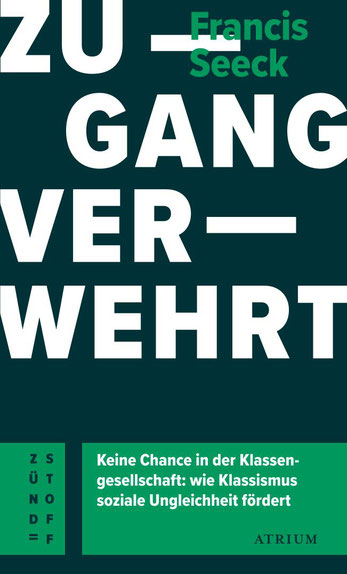Understanding Classism
Seeck, Francis: Zugang verwehrt. Keine Chance in der Klassengesellschaft: wie Klassismus soziale Ungleichheit fördert. Atrium Verlag. 2022.
DOI:
https://doi.org/10.17169/ogj.2022.209Keywords:
Class, Discrimination, Poverty, Social InequalityAbstract
In this small volume on classism, Francis Seeck once again shows how German society is structured by the category of class and provides new insights that reveal devaluation mechanisms and promote the empowerment of those affected. In doing so, Seeck tries to take multiple discrimination seriously – an approach that seems interesting for gender studies, but is difficult.
Correction: This article is a corrected version of the review „Klassismus verstehen". The original version contained incorrect information about Francis Seeck. It was depublished on 31.10.2022 and replaced by the corrected version.
References
Dowling, Emma/van Dyk, Silke/Graefe, Stefanie (2017): Rückkehr des Hauptwiderspruchs? Anmerkungen zur aktuellen Debatte um den Erfolg der Neuen Rechten und das Versagen der „Identitätspolitik“. PROKLA. Zeitschrift für Kritische Sozialwissenschaft 47 (188), 411–420. doi: https://doi.org/10.32387/prokla.v47i188.69
Kemper, Andreas (2014): Klassismus: Theorie-Missverständnisse als Folge fehlender anti-klassistischer Selbstorganisation? Replik zu Christian Baron: Klasse und Klassismus, PROKLA 175. PROKLA. Zeitschrift für Kritische Sozialwissenschaft 44 (176), 425–429. doi: https://doi.org/10.32387/prokla.v44i176.165
van Dyk, Silke/Graefe, Stefanie (2019): Wer ist schuld am Rechtspopulismus? Zur Vereinnahmung der Vereinnahmungsdiagnose: eine Kritik. In: Leviathan 47 (4), 405–427. doi: https://doi.org/10.5771/0340-0425-2019-4-405

Downloads
Published
How to Cite
License
All contributions in Open Gender Journal are published under the Creative Commons Attribution 4.0 International license. You may freely make use of the corresponding texts in accordance to the conditions of the license (License contract, generally understandable version). There is no exclusive transfer of usage rights ("copyright transfer"). Open Gender Journal does not charge authors any costs for publication (so-called Article Processing Charges, APC) or submission (so-called Submission Charges). Authors are encouraged to share their contributions in other places, such as repositories.












